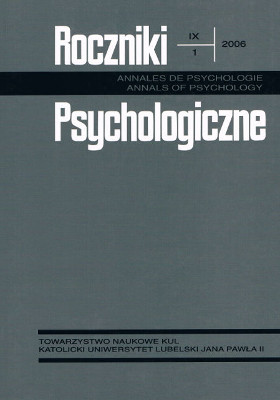Psychologia jako nauka humanistyczna. Podejście chrześcijańskie źródłem inspiracji
References
Buckminster Fuller, R. (1997). Synergics. Explorations in geometry of thinking. Sebastopol, CA: Estate of Buckminster Fuller.
Corning, P. A. (1998). The synergism hypothesis. On the concept of synergy and it’s role in the evolution of comples systems. Journal of Social and Evolutionary Systems, 21, 2.
Gibson, J. J. (1979). The ecological approach to visual perception. Boston: Houghton Mifflin, Comp.
Giorgi, A. (2002). Psychologia jako nauka empiryczna uprawiana z ludzkiej perspektywy. Podejście fenomenologiczne. Białystok: Trans Humana (oryg. Psychology as a human science. A phenomenologically based approach. New York: Harper & Row 1970).
Heron, J. (1996). Co-operative inquiry. Research into the human condition. London: Sage, Publ.
Koffka, K. (1935). Principles of gestalt psychology. New York: Harcourt, Brace.
Maslow, A. (1966). The psychology of science: A reconnaissance. New York: Harper & Row.
Rogers, C. R. (1955). Persons or science? A philosphical questions. American Psychologist, 10, 267-278.
Rogers, C. R. (1961). On becoming a person. Boston: Houghton Mifflin.
Stern, W. (1938). General psychology from the personalistic standpoint. New York: Macmillan.
Uchnast, Z. (1994). Reinterpretacja założeń psychologii postaci: od modeli całości jako symbolicznej figury do modelu całości naturalnej jako ekosystemu. Roczniki Filozoficzne, 42, 4, 33-71.
Uchnast, Z. (1999). Osobowa postawa wiary: model jakościowej analizy. Roczniki Psychologiczne, 2, 33-53.
Uchnast, Z. (2003). Osoba ludzka jako przedmiot psychologii. Implikacje założeń podejścia fenomenologicznego i psychologii postaci. W: P. Francuz, P. Oleś, W. Otrębski (red.), Studia z psychologii w Katolickim Uniwersytecie Lubelskim (t. 11, s. 11-20). Lublin: Wydawnictwo KUL.
Corning, P. A. (1998). The synergism hypothesis. On the concept of synergy and it’s role in the evolution of comples systems. Journal of Social and Evolutionary Systems, 21, 2.
Gibson, J. J. (1979). The ecological approach to visual perception. Boston: Houghton Mifflin, Comp.
Giorgi, A. (2002). Psychologia jako nauka empiryczna uprawiana z ludzkiej perspektywy. Podejście fenomenologiczne. Białystok: Trans Humana (oryg. Psychology as a human science. A phenomenologically based approach. New York: Harper & Row 1970).
Heron, J. (1996). Co-operative inquiry. Research into the human condition. London: Sage, Publ.
Koffka, K. (1935). Principles of gestalt psychology. New York: Harcourt, Brace.
Maslow, A. (1966). The psychology of science: A reconnaissance. New York: Harper & Row.
Rogers, C. R. (1955). Persons or science? A philosphical questions. American Psychologist, 10, 267-278.
Rogers, C. R. (1961). On becoming a person. Boston: Houghton Mifflin.
Stern, W. (1938). General psychology from the personalistic standpoint. New York: Macmillan.
Uchnast, Z. (1994). Reinterpretacja założeń psychologii postaci: od modeli całości jako symbolicznej figury do modelu całości naturalnej jako ekosystemu. Roczniki Filozoficzne, 42, 4, 33-71.
Uchnast, Z. (1999). Osobowa postawa wiary: model jakościowej analizy. Roczniki Psychologiczne, 2, 33-53.
Uchnast, Z. (2003). Osoba ludzka jako przedmiot psychologii. Implikacje założeń podejścia fenomenologicznego i psychologii postaci. W: P. Francuz, P. Oleś, W. Otrębski (red.), Studia z psychologii w Katolickim Uniwersytecie Lubelskim (t. 11, s. 11-20). Lublin: Wydawnictwo KUL.
Published
2019-03-27
Issue
Section
Discussion
Copyright (c) 2006 Roczniki Psychologiczne

This work is licensed under a Creative Commons Attribution-NonCommercial-NoDerivatives 4.0 International License.


